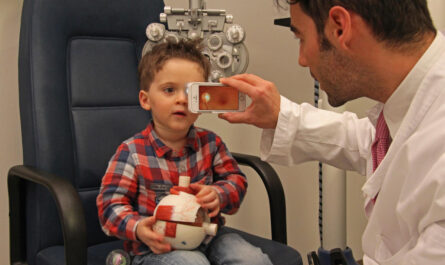Unleashing the Power of Digitalization in Medical Care
With advancements in technology rapidly transforming various industries, healthcare has also realized the need to embrace digitization and automated solutions. Smart hospitals aim to improve patient care and optimize resource utilization through deployment of advanced digital tools and platforms.
Adoption of Electronic Health Records
One of the first steps towards creating a smart hospital is implementing an Electronic Health Record (EHR) system. EHRs allow doctors, nurses and other healthcare professionals to access patient medical records digitally. This helps eliminate paperwork and facilitates seamless sharing of patient data across departments. EHRs also make it easier to monitor patients’ medical history, track treatment progress and identify any issues at an early stage. Many smart hospitals are investing in EHR solutions that can be securely accessed from anywhere, allowing for better coordination of care even when patients are outside the hospital.
Leveraging Real-time Patient Monitoring Technologies
Cutting-edge medical devices and sensors are enabling round-the-clock monitoring of patients’ vital signs without disrupting their normal activities. Smart beds equipped with pressure sensors can detect if a patient is trying to get up unassisted and alert caregivers. Wearable biosensors continuously track heart rate, blood pressure, oxygen levels and other metrics. Any deviations from normal parameters trigger automatic alerts to nurses’ stations. During surgeries, special sensors attached to patients closely monitor brain activity, blood loss and other parameters to aid decision making. Real-time patient data from these systems is logged into centralized dashboards for constant oversight by doctors and nurses.
Empowering Patients through Mobile Apps
Smart Hospitals are developing mobile apps to empower patients and improve access to care. Using these apps, patients can easily view test reports, check appointment schedules, connect with caregivers and access health library resources from anywhere. Some apps even allow remote monitoring of chronic conditions through home use of connected medical devices. This enables early detection of potential health issues and reduces need for frequent hospital visits. Apps with telemedicine features are enabling video consultations with doctors without having to visit clinics. Overall, such solutions are enhancing patient experience and engagement in their own care.
Adopting Automated Processes with Robotic Systems
Robots are being deployed in smart hospitals to automate repetitive and hazardous tasks currently performed by clinical staff. Robotic surgical systems with advanced 3D imaging and miniaturized instruments are assisting complex surgeries. AI-powered robotic disinfection systems like ultraviolet light bots help deep clean patient rooms and operating theaters, reducing risks of hospital-acquired infections. Automated guided vehicles (AGVs) are used to transport medical supplies, samples and meals within the hospital. This reduces waste and streamlines logistical operations. Drones help make timely deliveries of critical items like blood samples or medicines between different hospital facilities located far apart.
Leveraging Big Data and Artificial Intelligence
Advanced data analytics tools and AI solutions offer tremendous benefits to smart hospitals. Data from various sources like EHRs, biosensors, diagnostic scans and patient demographics is aggregated on secured servers. Powerful analytics on this big medical data helps identify patterns, predict outcomes and optimize clinical decision making. AI algorithms can analyze population health trends to devise more effective prevention strategies. Image recognition using deep learning expedites review of radiology scans. NLP technologies enable virtual assistants to answer basic patient queries thereby reducing workload on staff. Smart scheduling tools using predictive algorithms ensure efficient resource planning and smoother workflows. Overall, big data and AI are enabling smarter clinical and administrative decisions within digitally transformed hospitals.
Embracing Cloud Computing Infrastructure
Leveraging cloud platforms is key to delivering advanced solutions at smart hospitals in a cost-effective way. The cloud allows centralized storage and easy sharing of voluminous patient data as well as imaging files across different departments. It provides the scalability and flexibility to support computationally intensive applications involving AI, analytics and simulations. Powerful cloud servers ensure seamless operations of resource-intensive systems like telemedicine platforms even during peak loads. Healthcare institutions get instant upgrades to new software and technologies through cloud-based software-as-a-service models, avoiding expensive on-premise upgrades. Edge computing helps run latency-sensitive tasks involving real-time patient data localization on dedicated on-premise servers integrated with cloud back-ends.
Building a Connected Medical Campus
Successful smart hospitals are working towards developing fully connected medical campuses. High-speed internet backbone across indoor and outdoor areas minimizes network bottlenecks. Dedicated wireless networks support a multitude of connected devices and systems. Internet of Medical Things (IoMT) sensors enable automated monitoring of assets and infrastructure. Environmental sensors regulate air quality, temperature monitoring leak detection. Integrated building management systems centrally control access controls, utilities, lifts, door locks and surveillance tools through a unified dashboard. Intra-campus communication is enabled through technologies like wireless paging systems and mobile staff apps. Such connectivity allows unified oversight and optimized functioning of entire hospital premises.
Ensuring Robust Cybersecurity
Given the sensitivity of patient data handled in digital form, robust cybersecurity measures are paramount for smart hospitals. Data privacy and protection should be as per domestic laws as well international standards like HIPAA and GDPR. Healthcare institutions employ multi-layered security strategies involving perimeter defenses, endpoint protection, identity & access management solutions. Strict access controls regulate which users can view or modify which types of records. Encryption ensures data in transit or at rest within internal systems or public cloud servers cannot be compromised. Continuous monitoring through AI-powered tools helps detect any anomalies or breaches proactively. Strict change management protocols regulate software and hardware updates to infrastructure. Regular employee cyber awareness training
*Note:
1. Source: Coherent Market Insights, Public sources, Desk research
2. We have leveraged AI tools to mine information and compile it.



